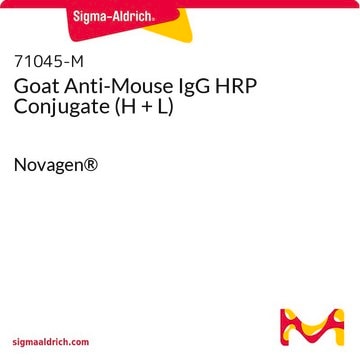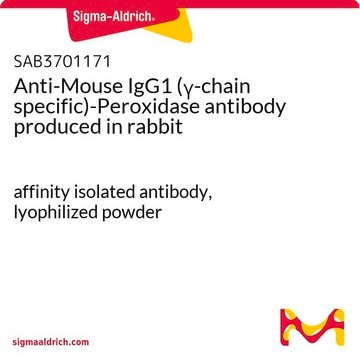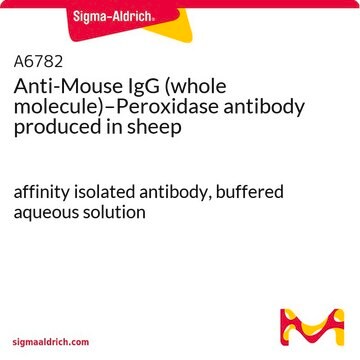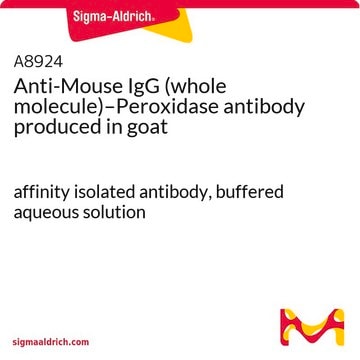A3682
Anti-Mouse IgG (Fab specific)–Peroxidase antibody produced in goat
affinity isolated antibody, buffered aqueous solution
Sinónimos:
Goat Anti-Mouse IgG (Fab specific)- HRP
About This Item
Productos recomendados
biological source
goat
conjugate
peroxidase conjugate
antibody form
affinity isolated antibody
antibody product type
secondary antibodies
clone
polyclonal
form
buffered aqueous solution
species reactivity
mouse
should not react with
human, rat
technique(s)
direct ELISA: 1:40,000
immunohistochemistry (formalin-fixed, paraffin-embedded sections): 1:150
western blot: 1:80,000-160,000 using detecting β-actin in total cell extract of HeLa cells (5-10 μg per lane)
shipped in
dry ice
storage temp.
−20°C
target post-translational modification
unmodified
¿Está buscando productos similares? Visita Guía de comparación de productos
General description
Goat anti-mouse IgG (Fab specific)-peroxidase antibody is specific for mouse IgG and the Fab fragment of mouse IgG. The antibody reacts with all mouse IgG subclasses (G1, G2a, G2b and G3) and also with mouse IgA, IgM and IgE. Moreover, the antibody conjugate shows no reactivity with the Fc fragment of mouse IgG or with human and rat IgG.
Immunogen
Application
- enzyme-linked immunosorbent assay (ELISA)
- immunohistochemical studies
- dot or immunoblotting
Biochem/physiol Actions
Physical form
Preparation Note
Disclaimer
¿No encuentra el producto adecuado?
Pruebe nuestro Herramienta de selección de productos.
signalword
Warning
hcodes
Hazard Classifications
Skin Sens. 1
Storage Class
12 - Non Combustible Liquids
wgk_germany
WGK 2
flash_point_f
Not applicable
flash_point_c
Not applicable
Certificados de análisis (COA)
Busque Certificados de análisis (COA) introduciendo el número de lote del producto. Los números de lote se encuentran en la etiqueta del producto después de las palabras «Lot» o «Batch»
¿Ya tiene este producto?
Encuentre la documentación para los productos que ha comprado recientemente en la Biblioteca de documentos.
Los clientes también vieron
Nuestro equipo de científicos tiene experiencia en todas las áreas de investigación: Ciencias de la vida, Ciencia de los materiales, Síntesis química, Cromatografía, Analítica y muchas otras.
Póngase en contacto con el Servicio técnico


















